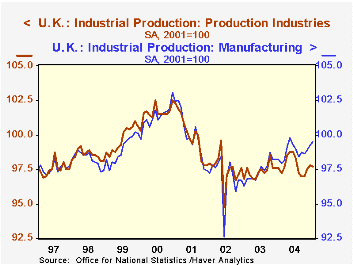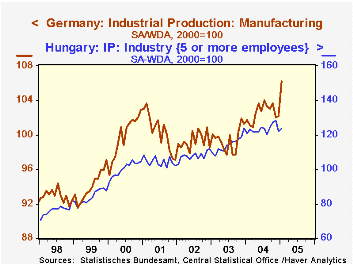 Global| Mar 09 2005
Global| Mar 09 2005Manufacturing Output in UK, Germany, Others Maintains Hesitant Growth in January
Summary
Industry in Europe is generally gaining ground. January industrial production reports for five countries indicate firming trends, particularly in manufacturing sectors. In the UK factory output rose 0.2% in January and is 1.3% ahead [...]

Industry in Europe is generally gaining ground. January industrial production reports for five countries indicate firming trends, particularly in manufacturing sectors. In the UK factory output rose 0.2% in January and is 1.3% ahead of a year ago. In Germany, it was up a substantial 3.9% in the month and 4.4% from January 2004. At the same time, total industry output was restrained in both of these countries by weakness in other industry; in the UK, a steep downtrend in oil and gas extraction is pulling mining activity down sharply: 1.4% in January and 7.7% in the last year. Germany's mining sector carries a smaller weight the total, but it too has been generally negative: a 2.8% drop in January interrupted what had been a developing recovery and left the mining index 4.2% below the year-earlier amount. All told, then, industrial production in the UK was off marginally in January and just barely above a year ago. In Germany, total output is managing a climb, although somewhat more gradual than the manufacturing sector alone (this applies to Germany's "production excluding construction", to make the coverage comparable to the UK).
The same combination holds in the Netherlands: factory output rose 2.0% in January, but total output decreased 0.9%. Dutch mining activity, though, had been quite strong through much of 2004 and has moved erratically, with wide up and down swings since October.
In two smaller regions, production is headed higher, albeit somewhat irregularly. In Hungary total output was up 1.3% in January and 2.4% from the year-ago. This was a turnaround from a 1.8% decrease over the 12 months ended December. In Turkey, January's output eased 0.4% from December, but has climbed 6.5% in the last year.
As we have pointed out here before, economic activity in Europe is holding up well, despite the strength in the euro, and as well, despite rising energy costs. In part, this results from the importance of trade within Europe itself and with other countries whose currency is not tied to the dollar. This strength in the euro has also diminished the force on those countries of the rise in dollar-priced energy products.
| European Industrial Production | Jan 2005 | Dec 2004 | Year Ago | 2004 | 2003 | 2002 |
|---|---|---|---|---|---|---|
| UK (2001=100) | 97.7 | 97.8 | 97.6 | 97.8 | 97.3 | 97.5 |
| Manufacturing | 99.5 | 99.3 | 98.2 | 98.8 | 97.4 | 96.9 |
| Germany (2000=100) | 105.6 | 102.3 | 101.7 | 102.4 | 99.5 | 99.1 |
| Manufacturing | 106.2 | 102.2 | 101.7 | 102.6 | 99.5 | 99.3 |
| Netherlands (2000=100) | 98.9 | 99.8 | 99.9 | 99.9 | 97.7 | 100.1 |
| Manufacturing | 97.6 | 95.7 | 98.2 | 96.1 | 95.8 | 98.5 |
| Hungary (2000=100) | 123.4 | 121.9 | 120.6 | 123.3 | 114.3 | 107.8 |
| Turkey (1997=100) | 127.9 | 128.4 | 120.1 | 123.4 | 112.4 | 103.4 |
Carol Stone, CBE
AuthorMore in Author Profile »Carol Stone, CBE came to Haver Analytics in 2003 following more than 35 years as a financial market economist at major Wall Street financial institutions, most especially Merrill Lynch and Nomura Securities. She had broad experience in analysis and forecasting of flow-of-funds accounts, the federal budget and Federal Reserve operations. At Nomura Securities, among other duties, she developed various indicator forecasting tools and edited a daily global publication produced in London and New York for readers in Tokyo. At Haver Analytics, Carol was a member of the Research Department, aiding database managers with research and documentation efforts, as well as posting commentary on select economic reports. In addition, she conducted Ways-of-the-World, a blog on economic issues for an Episcopal-Church-affiliated website, The Geranium Farm. During her career, Carol served as an officer of the Money Marketeers and the Downtown Economists Club. She had a PhD from NYU's Stern School of Business. She lived in Brooklyn, New York, and had a weekend home on Long Island.





